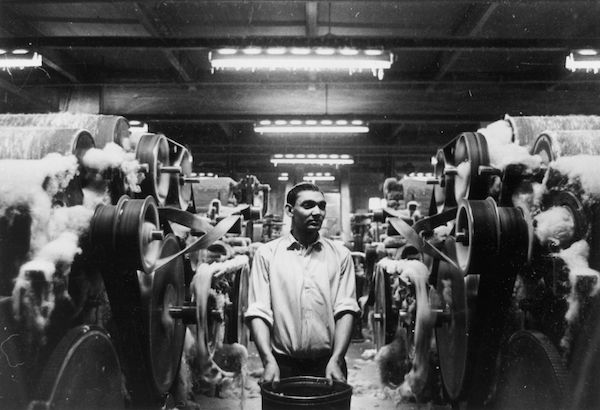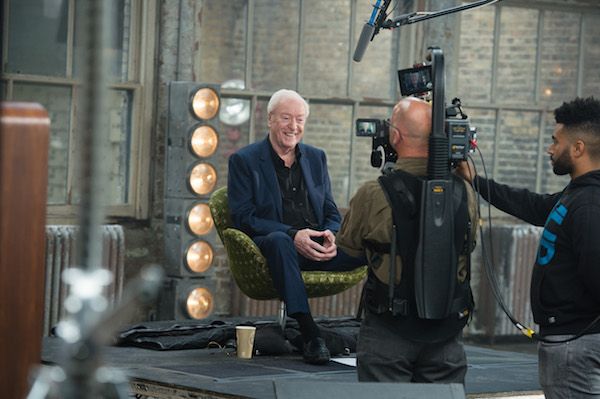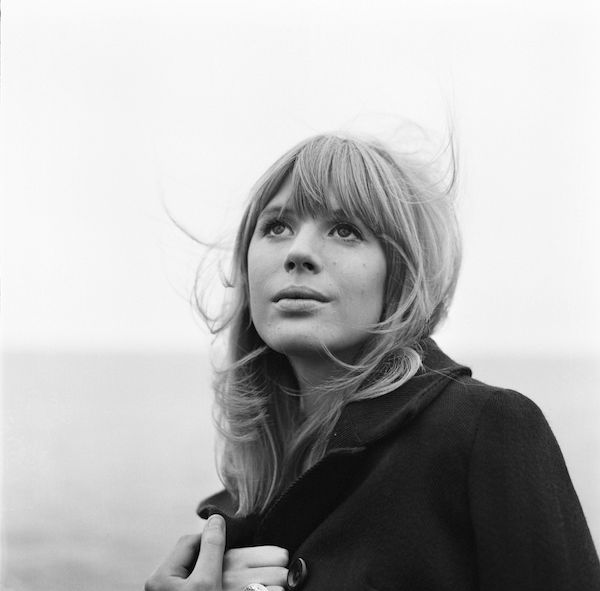

Share
10th March 2018
12:41pm GMT

“If only I knew then what I know now.”The more I think about it the more I realise that saying is something I think to myself on a regular basis. But while I wish I could have paid more attention to certain things as a child I know it was highly unlikely I would have absorbed anything else. When you’re younger you only digest what you want to digest and what’s immediately in front of you. Learning about what came before you at that age seemed like extra homework so why would you do it? I turned 35-years-old last month and these past few years have been some of the most important in my life. I’ve been on a bit of a mission of self-discovery, and I don’t mean in the sense that I don’t know who I am, it's more to do with me learning more about the things I already know and love - mainly around music and culture. I’ve delved a lot deeper into the roots of my passions and dedicated my spare time to learning, be it through reading books, watching documentaries, or talking to those that came before me. Even as a young adult I wasn’t too concerned about what was going on in Britain. Because of my love for Hip Hop culture and African American history admittedly I was more fixated with what was going on in the U.S. than what was going on in my own country. I essentially dismissed my own culture in exchange for the one that spoke to me as a youngster. Now there’s nothing wrong with being inspired by things outside of your own culture but there should always be, at the very least, a basic knowledge of the things going on in your own backyard. So imagine this: I’m in my zone sucking up as much information as I can about Britain and its thriving pop culture scene and an email lands in my inbox. The email was titled: **SCREENING INVITE** MY GENERATION. Instantly I’m intrigued because I love movies, and even more than that I love seeing movies before anyone else. I read on and discover that it’s actually a Michael Caine-fronted documentary about Britain in the ‘60s and how it influenced a whole generation of young people to be themselves and take charge of their futures. What kind of wizardry was this? Were the PR agency who sent me the email listening in on my conversations through some hi-tech surveillance system? With that theory being extremely doubtful, I put it down to the universe reminding me that you attract what you put out into the world. So, looking to add more nuggets of knowledge to my basic understanding of the social climate in Britain during previous decades, and looking to build upon my already extensive natural knowledge of music throughout those same years, My Generation couldn’t have come at a better time. https://www.youtube.com/watch?v=lv2jNR8VVFo Michael Caine kicks off the documentary by recalling the mindstate of young people during the '60s:
“We’re here, this is our society and we’re not going away!”This is where the education begins. Britain, up until the ‘60s, might have been considered stable and conventional but it was pretty dull. In fact it wasn’t just the television sets that were black and white, the whole damn country was. Think about it, how many colour photographs have you seen from before the ‘60s? Exactly.
 What was going on in the fifties was pretty run-of-the-mill. If you weren’t in the upper class you went out and made an ‘honest living’ on the markets, in the factories, or out and about doing construction. You weren’t given the opportunity to flex your creative muscles, neither were you ever encouraged to do so. This was just something you accepted.
You went to work and then you went home. If you were a man you took a detour via the pub while women were mostly housewives so they were already at home making dinner. Pretty boring (and misogynistic) stuff, right?
What was going on in the fifties was pretty run-of-the-mill. If you weren’t in the upper class you went out and made an ‘honest living’ on the markets, in the factories, or out and about doing construction. You weren’t given the opportunity to flex your creative muscles, neither were you ever encouraged to do so. This was just something you accepted.
You went to work and then you went home. If you were a man you took a detour via the pub while women were mostly housewives so they were already at home making dinner. Pretty boring (and misogynistic) stuff, right?
“My parents always used to talk about the good old days, but what was so good about them?” - Michael CaineWhen the ‘60s rolled around young people wanted to buck the trend. They wanted to do away with tradition and challenge the elitist hypocrisy and free themselves from the class shackles. They were going to be the first to break the cycle. It was at this point the ‘swinging sixties’ were born and pop culture was about to change the world… forever. So what changed? Well, the music for starters. While rock and roll had begun to take shape in Britain sometime in the ‘50s it wasn’t until the following decade that it really blew up. The ‘British Invasion’ happened with artists like The Rolling Stones, Marianne Faithfull and The Who crossing the pond to the United States and showcasing a new sound and style that in turn inspired American artists such as Jimi Hendrix to move to the UK to see what all the fuss was about. But the band that really put Britain on the map was of course The Beatles. There was no escaping Beatle-mania during the ‘60s. Paul, John, George and Ringo were everywhere. Four lads from Liverpool became the perfect example of how music influenced the lives on young Britons. Their music was simplistic to begin with - they covered “Twist and Shout” early on in their career - and then taking it upon themselves to colour outside the lines their music grew to be innovative, which in turn inspired an entire generation to be themselves, to explore love, life and their imagination. https://www.youtube.com/watch?v=usNsCeOV4GM Not sure about how much influence The Beatles had? Their 1967 album Sgt. Pepper’s Lonely Hearts Club Band encouraged rebellion against an elitist system and challenged the authorities. As a band they preached free love and provided a musical representation of its generation and the contemporary counterculture. Going on to inspire bands like The Beach Boys, it was the first rock album to receive Album of the Year at the Grammy Awards. Now as a die hard music fan this is mind blowing to me. Today we celebrate the likes of Kendrick Lamar, Stormzy, Lily Allen, Adele, and U2, who all offer a voice for the voiceless and are constantly challenging the way things are done in a society that still isn’t perfect. The Beatles are the reason they’re able to do this.
“You’re only supposed to blow the bloody doors off!” - Michael Caine (The Italian Job)In the movie world you had Michael Caine shooting down the stereotype that as an actor you had to be a “straight-laced” posh speaking Duke or Duchess-type character. He put cockneys on the big screen, and he did it proudly. Just think without Michael Caine Lock, Stock and Two Smoking Barrels would have sounded like Pride & Prejudice - I’m cringing just at the thought of it.
 Jobs were made available for young women in the ‘60s, and it was at this point that feminism began to become a more influential ideology. The Women’s Liberty movement was in its early stages when in 1968 at a Dagenham Ford factory 850 women went on strike requesting the same pay as their male co-workers. Soon after in 1970, the Equal Pay Act was passed.
Then there’s the fashion. I mean, c’mon. Mirroring the social changes that were going on, geometric shapes and vibrant colour schemes were introduced into the fold. Mary Quant became famous for popularising the mini skirt, which was designed to be free and liberating for women and it became the epitome of ‘60s fashion. What seemed outrageous a decade earlier was now leading the charge in cutting edge self-expression. The hippie movement had arrived and fashion played a big part in it.
Men were wearing psychedelic prints as well as experimenting with suits and how they fitted. Not only that, they were growing their hair long, much to the disgust of the older generation. And speaking of hair, the old rule book was being torn up, especially for women. Vidal Sassoon was a whizz with a pair of scissors. He brought a sense of style to hairdressing thanks to his geometric bob cut that was seen everywhere and on everyone, including various high-profile celebrities.
Models were becoming celebrities, thanks in part to photographers like David Bailey, Terence Donovan and Brian Duffy, who were dubbed ‘the black trinity’, and who themselves were becoming celebrities. It’s them we have to thank for game-changing models such as Twiggy, Jean Shrimpton and Joanna Lumley - yes, Patsy Stone of Absolutely Fabulous started out as a model.
Jobs were made available for young women in the ‘60s, and it was at this point that feminism began to become a more influential ideology. The Women’s Liberty movement was in its early stages when in 1968 at a Dagenham Ford factory 850 women went on strike requesting the same pay as their male co-workers. Soon after in 1970, the Equal Pay Act was passed.
Then there’s the fashion. I mean, c’mon. Mirroring the social changes that were going on, geometric shapes and vibrant colour schemes were introduced into the fold. Mary Quant became famous for popularising the mini skirt, which was designed to be free and liberating for women and it became the epitome of ‘60s fashion. What seemed outrageous a decade earlier was now leading the charge in cutting edge self-expression. The hippie movement had arrived and fashion played a big part in it.
Men were wearing psychedelic prints as well as experimenting with suits and how they fitted. Not only that, they were growing their hair long, much to the disgust of the older generation. And speaking of hair, the old rule book was being torn up, especially for women. Vidal Sassoon was a whizz with a pair of scissors. He brought a sense of style to hairdressing thanks to his geometric bob cut that was seen everywhere and on everyone, including various high-profile celebrities.
Models were becoming celebrities, thanks in part to photographers like David Bailey, Terence Donovan and Brian Duffy, who were dubbed ‘the black trinity’, and who themselves were becoming celebrities. It’s them we have to thank for game-changing models such as Twiggy, Jean Shrimpton and Joanna Lumley - yes, Patsy Stone of Absolutely Fabulous started out as a model.
 Can you believe there was a time when Vogue wouldn’t put a model on the cover because of their accent? THEIR BLOODY ACCENT! It’s crazy to think there was a time when a global publication such as Vogue was as small minded as that. Could you imagine that happening today?
Everything went on in Britain in the ‘60s. It seemed like something new was happening, or being designed, or being celebrated every single year. The contraception pill was first introduced in 1961 and was then made available for all women in 1967. A newly elected Labour government took power in 1964. England won the World Cup in 1966. The first regular colour television broadcast took place in 1967.
Can you believe there was a time when Vogue wouldn’t put a model on the cover because of their accent? THEIR BLOODY ACCENT! It’s crazy to think there was a time when a global publication such as Vogue was as small minded as that. Could you imagine that happening today?
Everything went on in Britain in the ‘60s. It seemed like something new was happening, or being designed, or being celebrated every single year. The contraception pill was first introduced in 1961 and was then made available for all women in 1967. A newly elected Labour government took power in 1964. England won the World Cup in 1966. The first regular colour television broadcast took place in 1967.
“Never, ever dream small." - Michael CaineI’m a natural born creative so I couldn’t imagine a world without the freedom to create. So I’m thankful for the ‘60s and the young people who chose individuality over societal expectancy. I also need to thank the parents of the ‘60s generation, who fought for their lives in the Second World War and decided that they’d rather their children live a life of freedom instead of one restricted by classism. With that said, My Generation gives you an insight into how Britain could have turned out. We often take it for granted that we are as free as we are. We’re building businesses via the internet, we’re putting ourselves out there into the world with no consequence, we’re standing up for what’s right. We’re not taking everything fed to us as gospel, instead we’re going out there and finding the answers for ourselves. The ‘60s paved the way for us to be able to do that. I wouldn’t be sat here writing this article if it wasn’t for the ‘60s. Forget the fact that I wouldn’t have a topic to write about, as a young person I was given creative freedom to explore my passions. I’ve travelled the world, I lived on my own from a young age, I used music as a form of expression. Hell, JOE might not even be here because it was started by a creative individual who was following his passions too - shout out to Niall McGarry. So next time you want to dismiss something as ‘old' or ‘boring’ or ‘out of touch’ just because it came before you, think again. Think about those people that put themselves on the line just so you could live a better life. We’re free and it’s a beautiful thing. An exclusive Q&A with Michael Caine will be broadcast live March 14th when My Generation arrives in movie theatres. For more information visit: https://www.mygenerationmovie.co.uk/

Entertainment - JOE.co.uk | Joe.co.uk
entertainment